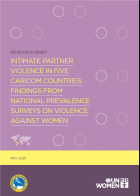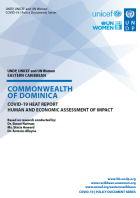41 - 60 of 114 Results
Pagination
Date:
JMMB Group is a financial group serving over 325,000 clients in the Caribbean, with locations in Jamaica, Trinidad and Tobago and the Dominican Republic. In this case study, we explore how this group of companies used principle 2 of the Women’s Empowerment Principles to support the health and well-being of all employees and facilitate a family-first culture.
Date:
The Private Sector Organisation of Jamaica (PSOJ) is a national organisation of private sector associations, companies and individuals working together to promote a competitive and productive private sector. The organisation influences issues of national policy of a political, social, or economic nature, as well as the development of the private sector. In the case study, learn more about how the PSOJ are advocating for gender equality in the workplace for all their member companies through training.
Date:
The COVID-19 pandemic has been a profound shock to the Jamaican society and economy. There is no question that while health workers have been on the frontlines responding to COVID-19, the impact has been felt across all walks of society. While everyone is facing unprecedented challenges, the crisis has laid bare and exacerbated the growing economic divide within, between and across socio-economic groups, particularly for women. Women have had to balance work and the availability and affordability of care, and have experienced income loss and been at increased risk of gender-based violence. The COVID-19 pandemic has deepened existing inequalities.
Date:
FLOW Jamaica, a subsidiary of Liberty Latin America (LLA), is a communications and entertainment provider of cable television, internet, telephone and wireless services. This company has created numerous policies to treat all women and men fairly at work, without discrimination, and to ensure the safety and well-being of all employees.
Date:
Prevalence of VAWG in the Caribbean is among the highest in the world. VAWG has proven to be so entrenched and normalized that both men and women have a high tolerance for its manifestations, particularly when perpetrated in the context of intimate partner relationships. Data from a variety of sources confirm that even young people hold these views, raising concerns about the intergenerational transmission of VAWG.
Date:
This policy brief discusses the potential and limitations of universal basic income (UBI) from a gender perspective and points to some of the specific design features that policymakers need to consider to make UBI work for women and transgender and gender-diverse people.
Date:
The COVID-19 pandemic has posed a tremendous threat to global health, poverty reduction gains and advances made towards gender equality. Globally, by April 13, 2021, 136,115,434 confirmed cases, and 2,936,916 deaths had scarred nations. The 35 countries/territories in the Caribbean region alone had suffered 630,239 confirmed cases and 8,571 deaths, as of April 6, 2021. Still, this pandemic has had impacts far beyond public health.
Date:
Based on research conducted by Dr. Simon Naitram; Ms. Stacia Howard and Dr. Antonio Alleyne This report forms part of the COVID-19 Human and Economic Assessment of Impact (HEAT) Series. The COVID-19 pandemic is projected to increase the strain on the economy as supply chain disruptions, reduced domestic consumption and lower remittances will increase the downward pressure on economic growth. Building on baseline scenarios, the report presents the likelihood of a GDP decline in excess of...
Date:
Based on research conducted by Dr. Winston Moore This report forms part of the COVID-19 Human and Economic Assessment of Impact (HEAT) Series. The Government implemented a series of measures designed to respond to the health, economic and social impacts of the virus. These interventions include a substantial increase in health sector expenditure equivalent to 0.5% of GDP, the deployment of international disease specialists and a robust testing and quarantine programme, which has...
Date:
Women’s Health and Life Experiences: A Qualitative Research Report on Violence Against Women in Grenada, 2018
Date:
Authors/editor(s): CLAUDIA NICHOLSON; HALIMAH DESHONG The Grenada Women’s Health and Life Experiences Study 2018 Report has produced, for the first time, nationally representative data on the prevalence of violence against women and girls in Grenada. The Grenada WHLES comprised a cross-sectional survey and qualitative research – interviews and focus group discussions – that were conducted in 2018 to ascertain the prevalence of violence against women and girls (VAWG) in...
Date:
Based on research conducted by Dr. Ankie Scott-Joseph This report forms part of the COVID-19 Human and Economic Assessment of Impact (HEAT) Series. Among its recommendations are: Increase gender-responsiveness of COVID-19 policy responses. Broaden safety protection support in the form of enhanced unemployment insurance with extended duration, increased benefits, relaxed eligibility, and expanding social assistance coverage through the establishment of a Welfare Development Fund. ...
Date:
Women are the majority of clerks, service workers and shop and market sales workers, and professionals. While skilled professionals can work from home where feasible, the rest of these women are severely impacted by the COVID-19 crisis: the women working in tourism and in non-essential services are not earning a wage, with women working in tourism out of a job for an unknown amount of time.
Date:
This report outlines a number of recommendations including: enabling the availability of low-cost options for internet access to improve the livelihood potential of the most vulnerable in society and reduce inequalities due to moving to online learning by broadening access to the internet for children in poverty; inclusion of informal workers into the formal economy through the National Insurance Scheme which in the long term will increase the number of contributions and significantly improve the health of the National Insurance Fund; expansion of the Central Bank of Barbados’ Credit Guarantee scheme; ensuring social assistance for all who need it, including making unemployment benefits for self-employed individuals permanent to reduce their vulnerability in times of uncertainty and increasing the attractiveness of the entrepreneurship sector which serves as the engine for economic growth; and increasing the limit on the Health Service Levy to expand healthcare facilities and make contributions progressive.
Date:
The HEAT assessment reports are a series of publications from the United Nations Sub-Regional Team in Barbados and the Eastern Caribbean which form part of the combined offer from the UN system to support countries in their response to the COVID-19 pandemic. Coordinated by the United Nations Development Programme, UNICEF and UN Women, the new HEAT report series will cover 8 Eastern Caribbean islands, providing deep insights, strategic recommendations and a framework to promote relief and resilience.
Date:
Gender-based violence (GBV) violence shelters 4 are safe places where survivors of intimate partner, domestic, and/or family violence can get help and temporary housing. GBV shelters provide critical support, immediate protection, safe emergency shelter, and longer-term transitional housing. Because of the nature of the shelters, survivors of violence may reside in proximity, for either a limited or extended period...
Date:
The extent of the socio-economic fallout from the COVID-19 pandemic has begun to shape the “new normal” for CARICOM Member States. A 1.5% contraction of Gross Domestic Product has already been estimated by the Economic Commission for Latin America and the Caribbean (ECLAC, 2020). While governments balance this “new normal,” there is also an ‘above-average’ forecast for the 2020 Atlantic Hurricane Season, which takes place from June 1 to November 30.
Date:
While leaders and the business community discuss when and how to open economies, it is critical that we think about the impact this will have on families, parents and those who care for the elderly. The work that happens inside the home, cooking, cleaning, care of children, and care of the elderly is called care-work. Although some families benefit from the support of domestic workers, most of the work done is unpaid or underpaid.
Date:
When compared to other regions, the number of CARICOM cases have been few, but are increasing. It will be necessary to develop and implement programmes and policies that will support inclusive socio-economic stability while efforts are made to contain the spread of the virus.
Date:
Crisis management or emergency situations such as COVID-19 can have serious impacts on the lives of women and girls, if gender dimensions are not considered. Issues such as care work, economic autonomy, physical or sexual violence, women's participation in decision-making, disaggregation of data by sex, gender analysis, and irregular migration are just some of the areas of concern that must be part of an effective response to the health crisis that the world is going through right now.




















